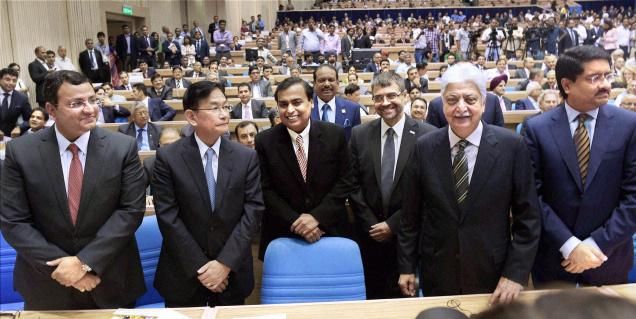 Big-ticket buyouts at the peak of valuation cycle failed to live up to the hype; smaller deals did better
Big-ticket buyouts at the peak of valuation cycle failed to live up to the hype; smaller deals did better
If Indian chief executives were asked to name one of their decisions in the past 15 years that they would want to reverse, the near unanimous answer could be -- their investment in foreign assets.
Be it the Ambanis, or Tatas or Birlas, most acquisitions by top Indian corporate houses have proved value destroyers, causing huge losses for shareholders.
In the first six years of this century, Indian companies were making small-ticket acquisitions abroad.
It is only since 2006 that billion-dollar investments began pouring in.
Tata Steel took corporate India by surprise with its gigantic $12.9-billion acquisition of Europe’s Corus Steel.
However, it also turned out to be the Tata group’s biggest value destroyer over time.
“In general, Indian companies failed to live up to the initial promise of globalisation.
"Most of their foreign ventures are either making losses or, if profitable, the returns are a fraction of what they earn in the domestic market,” says Dhananjay Sinha, head of institutional equity at Emkay Global Financial Services.
Tata Steel had in 2007 acquired Corus (now Tata Steel Europe) for around Rs 85,000 crore at the current exchange rate.
The asset will now fetch a fraction of the purchase price, as the share price of Tata Steel Europe’s peer, ArcelorMittal, the world’s top steel maker, is down nearly 95 per cent from the peak valuation in 2007.
The company decided to sell its long products division in Europe to Klesch Group to cut its losses, but the latter backed out amid falling commodity prices.
Besides, it took impairment charges on its parent’s account. The silver lining is that the group has finally managed to sign a letter of intent with Greybull Capital for the long products division.
Similarly, Bharti Airtel’s $10.7-billion acquisition of Zain’s Africa business in February 2010 failed to give Sunil Mittal’s Bharti Enterprises the desired results. In 2015, the company had to sell telecom towers in Africa to repay loans.
According to analysts, Havells India’s year-end transaction to sell two of its units at a loss to a Chinese rival is another example of corporate India’s globalisation dreams turning sour.
Havells had acquired SLI Sylvania in 2007 for $300 million (Rs 2,000 crore at current exchange rate) and pumped in nearly Rs 1,000 crore as equity to sustain its operations.
The deal now values Havells’ investment in Sylvania at Rs 1,340 crore and the company is exiting with a loss.
A similar fate seems to await other big-ticket corporate deals of like those of Tata Steel, Hindalco, Bharti Airtel, Tata Chemicals, Indian Hotels, Amtek Auto and Crompton Greaves.
Mukesh Ambani’s Reliance Industries, which invested $8 billion in shale-gas assets in the US is getting negative returns on its investment. The company has already started taking impairment charge on these assets.
The fall in crude oil price to below $40 a barrel was the main reason why shale gas became a loss-making proposition for all companies.
The acquisition of coal mines at the peak of coal prices hurt many Indian companies like Lanco, Adani, GVK, and Coal India. Coal India invested close to Rs 500 crore (Rs 5 billion) in two Mozambique blocks and later found that there was no coal worth extracting from those.
Similarly, Essar Group’s $600-million investment in Trinity Coal in the US turned bad; the company went into Chapter 11 in 2013.
Essar officials say they do not foresee any change in fortunes, as coal prices are at record lows.
The Aditya Birla group, which invested $6 billion in acquiring Novelis, also saw the value of its investment crashing with a fall in commodity prices.
Group chairman Kumar Mangalam Birla says the falling prices will have more negative impact on Hindalco as a manufacturer of alumunium than Novelis, which passes on the volatility in prices to its customers.
“I think if the prices continue to fall, operations of many companies will turn unprofitable. But, I think the fall in commodity prices is now behind us,” says Birla.
GVK’s $1.26-billion investment in Hancock Coal, Lanco’s $600-million one in Griffin and Adani Enterprises’ $1-billion one in the Australian coal sector in 2011, too, have little chances of recovery.
Analysts say the return on these investments will continue to be negative in the coming years, as coal prices remain at record lows.
The Adani family has invested an additional $2 billion in Australia’s Abbot Point port, which is making losses and there is zero return from investment.
The Adani group has made an ambitious plan to invest close to $10 billion more in developing a coal mine in Australia -- largest in the country’s history.
The project is currently stalled due to environmental opposition from local activists.
Among the few success stories, Tata Motors’ acquisition of Jaguar Land Rover stands out. The company has already recovered more than its initial investment of $2.3 billion (Rs 15,000 crore at current exchange rate) in JLR assets.
Similarly, Sun Pharma’s acquisition of Teva and Motherson Sumi’s acquisition of European auto-component makers SMR and Peguform have also performed relatively well.
These acquisitions brought incremental revenues and profits, opened new markets, and provided new capabilities to Indian buyers.
“The difference between success stories and failures could have been the cost of acquisition and the timing.
The big-ticket buyouts and those acquired at the peak of the valuation cycle generally failed to live up to the hype. Smaller deals were financially successful,” says Emkay’s Sinha.
With the fate of almost all of top companies’ foreign acquisitions in doldrums, Indian CEOs might like to make some serious course correction in the new year.
Image: India Inc expectes the economy to look up in FY16. Photograph: PTI












 © 2025
© 2025